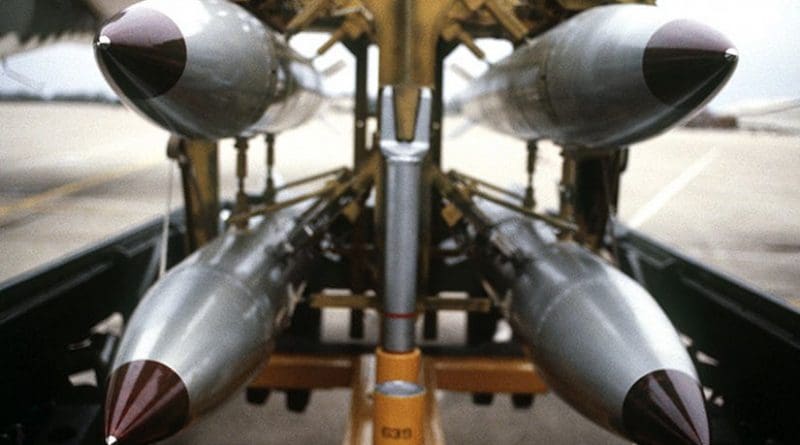Entry Into The NSG: Getting Past The Doorman – Analysis
By IPCS
By Manpreet Sethi*
Doormen – big, burly individuals – at entrances of exclusive clubs impose entry regulations. They could deny you entry for not carrying the correct identity card, or for not entering as a couple. One particular country has assigned itself this role at the NSG door. Set and resolute, it has declared that you are not carrying the required NPT identity card and worse still, you are not ready to enter with a partner. So, China insists that India cannot be allowed entry into NSG, certainly not without Pakistan.
For a few NSG plenary meetings now, India has been hopeful that a decision on its membership would be taken, nearly eight years after the exceptionalisation was made for it to engage in international nuclear commerce. This task yet remains pending though the US agrees that India has the requisite credentials to join the NSG. Standing up to the US on its position, China thinks otherwise. Interesting insights can be gleaned from the Chinese position.
Firstly, this is a rare occasion that China has openly declared its objection to India’s entry and has dared to stand alone on this. Beijing has traditionally been shy of taking a position where it would have to stand singly. It prefers instead to hide behind objections being made by others, giving them tacit support without being identified itself as the primary obstructionist. It consciously avoids being called a spoiler. This seems to have changed, perhaps for two reasons. One, China has perceived that the bulwark of states that it was banking upon to stop India’s entry into the NSG is about to give up. So, it feels the need to step up itself. The other reason is that China’s confidence in its own clout and influence has grown. Having amassed economic and military strength with the accompanying political weight, it believes it can afford to assert its position and get away with it. Consequently, it is no longer chary of standing alone.
Secondly, China’s sense of assertiveness rises from the knowledge that its economic power is far above that of most of the NSG members. In fact, neither US, nor Russia can afford to offend the new China, and certainly not on the nuclear issue. Undertaking simultaneous construction of 22 nuclear power plants (accounting for more than one third of all reactors being built globally), China has deep nuclear pockets. Nearly every major nuclear supplier has a hand in it. China is importing from, as well as co-developing nuclear reactors with France, Russia, and the US. It is building nuclear reactors in the UK and Argentina. The nuclear industry of each of these states is invested in China, currently the largest nuclear market. Given the downturn in the fortunes of the nuclear industry after Fukushima, the nuclear marketplace today belongs to the buyer, not the seller. And China is the biggest buyer on the block. Who then can afford to upset it?
Thirdly, China’s objection to India’s entry into the NSG is because of India, and not because it necessarily wants its all-weather friend to be an NSG member too. It is only using Pakistan as a proxy, as China always has, to box India in. What China finds difficult to digest is the accommodation of India that would, in its eyes, make it its nuclear equal. Given that Beijing still insists on UNSCR 1172 of 1998 that called for a roll back and elimination of an ‘illegitimate’ nuclear weapons programme, it cannot brook the idea of any semblance of ‘legitimacy’ being granted to India. Sharing space as a nuclear rule-maker with India is anathema to China.
So, what should India do to get past the self-appointed doorman? For one, Indian nuclear diplomacy will have to work harder to chip away at the objections being raised by China or its proxies. Secondly, the Indian nuclear market must once again appear to look lucrative. When it did so in the mid-2000s, President Bush (actively supported by the nuclear industry) managed to engineer the huge transformation in the US’ nuclear relationship with India, including convincing others to make the NSG exceptionalisation possible. Since then, and especially after Fukushima, the Indian nuclear market has started to look dull.
The nuclear liability law perceptibly weighed against the supplier, public acceptance stalemates etc have taken the sheen off India’s nuclear ambitions. Of the two poster boys of the nuclear industry, China is shining, while India appears to be falling behind. Thirdly, India should seriously consider entering the nuclear market as a supplier itself. It has the capability and the capacity to do so. And once that happens, it would change India’s de facto position. Fourthly, for China, its ‘face’ is very important. India needs to look for concessions that it can make to provide China the face saving to back off from its strident position. One idea here could be to take up China’s offer of nuclear cooperation made by Premier Xi Jinping on a visit to India. This cooperation could take many forms – R&D on new generation of reactors, between their nuclear Centres of Excellence, nuclear safety and security, etc. Such collaborative ventures could be one way of subtly introducing it to India’s strengths in the nuclear power sector.
* Manpreet Sethi
ICSSR Senior Fellow affiliated with the Centre for Air Power Studies (CAPS)


What a desperate bid to make China look bad. India needs to wake up and smell the coffee. You have 600 million people without toilets. China took 600 million people out of poverty in 20 years. As far as Pakistan is concerned didn’t the Pakistanis arrest Indian spies committing terrorism against Pakistanis in Baloschwand Karachi? The Kashmir issue still screams for a plebiscite which India isn’t allowing Pakistan has no problem with a plebiscite. India has even run to USA as its new best friend, so please put things into perspective. People are not dumb they understand the issues.